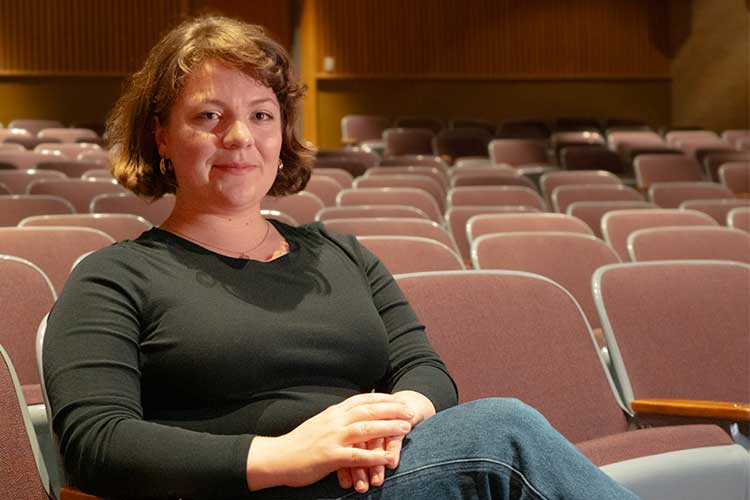Peck School of the Arts helps students explore a variety of arts-based subjects, including some that are somewhat obscure in the day-to-day world. Lillian Hayward, a theatre student, is exploring dramaturgy. Recently, Hayward explained dramaturgy and how this special type of theatrical research makes productions feel more realistic. Hayward served as dramaturg for the Department of Theatre’s productions of The Moors and Macbeth.
Can you explain to readers exactly what “dramaturgy” is?
A dramaturg is someone who looks at the context of the piece and then conducts research surrounding a play. They also work with the creative team and director to define setting and contextual elements throughout the piece. It’s specific theatrical research about a play. A dramaturg looks at history, context, and sociocultural matters. Sometimes, research is about set design, like furniture or architecture.
Recently, you worked on UWM’s production of The Moors, a black comedy set in 1840s England. What went into your research to ensure a successful production?
Well, part of the reason the dramaturgy role is somewhat unknown is because of its fluidity. The work done on a specific show is not going to be the same kind of work done on every other show. So, the work I did for The Moors was specific to the needs of that specific production, same goes for Macbeth.
The Moors is loosely based around the life and work of The Brontë family, specifically members Emily, Anne, and Charlotte. I did a lot of text work and research on them. I also worked with the cast to dive into the mindset of the time and the weight of the words. This is a modern piece, and we have some fantastically beautiful but difficult source material. We had to find a connection between the two.
Describe how being a SURF grant recipient this year helped expose you to the work of a dramaturg.
I am predominantly a stage manager, and we don’t do any research, but we are still a large part of the rehearsal process and have lots of information about our shows. I’ve always enjoyed being a source of knowledge so it’s nice to help the story along in a different way.
I have always been interested in history and literature. Last year in school I did a huge research project on art critic John Ruskin from the Victorian times—he was quite a man! I really woke up to the idea that I have a profound love of research. Around this time, I learned about the SURF grant, which was a great honor. I am very proud and feel very grateful to my professors, colleagues, and the whole theater department for encouraging me throughout my education.
Next month, your work on Macbeth will be showcased. What was the process of working on this show and how did it differ from The Moors?
Working on Macbeth was a beast! It is the first Shakespeare piece I’ve ever worked on in a collegiate setting, so it was brand new ground for me. So, I had to learn about the Jacobeans and Shakespeare. I worked with Dr. Robin Mello, and she has been a truly wonderful asset. We have been partners in this, and I have learned greatly from her writing and expertise.
With dramaturgy, there are the research and history components, but then there is also the communication aspect. So, with Macbeth, I’m writing dramaturgical notes, which you can find in the program at the show. They focus on and explore major themes in the show by looking at the text. I look forward to seeing the impact of the notes and getting feedback from audience members!
How do you anticipate audiences will interact with the research that went into Macbeth?
A large part of why the dramaturgical field is unknown is because a lot of it is done behind the scenes. Similar to The Moors, my name in the program is all the public really sees. Everything else is me working with the actors and the directors to flesh out the world that they see so we can communicate with the audience. You may not be able to see me, but you may feel my presence.
With Macbeth, it is largely the same. I work a lot with the company to discuss the Jacobeans, their motivations, and other themes throughout the play. Most of my work goes from the actors to the audience, in the actors’ bodies, minds, and how they talk.
What’s next for you?
In addition to dramaturgy, I am pleased to say that I am also an assistant stage manager for Macbeth. I wear many hats for this production!
Next up for me, I will be stage managing a production of An Iliad by Denis O’Hare and Lisa Peterson, which is a retelling of Homer’s Iliad. It is a one-woman show, and the lead actress is an alum of UWM. It is performing at Waukesha Civic Theatre in February.
Then, in the springtime, I am one of the directors for the New Dramaworks Short Play Festival here at UWM. I will be directing a short play by Maria Pretzl. This will be my directorial debut, and I look forward to stretching my creative side.
Lillian’s experience is an excellent example of how the tools at PSOA help students flourish in fields that may be brand new to them. With all the fascinating work that she has done, Lillian is certainly one to watch at UWM.
Information about upcoming events can be found on the PSOA Events Calendar.
Story by Jason McCullum
